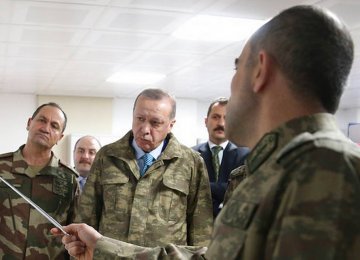News Analysis |
Turkish President Recep Tayyip Erdogan blasted NATO for not supporting the military action which Turkey launched against Kurdish stronghold in Afrin region of Syria. Operation Olive Branch was unleashed on January 20th 2018 when about 72 Turkish Air Force jets stormed into Syria and bombed Kurd held Afrin. Turkey has kept asserting the narrative that militia in the region, People Protection Units (YPG), is an offshoot of outlawed Kurdish Worker’s Party.
Talking in a meeting of his ruling AK party, President Erdogan sounded furious with his allies at NATO. He questioned that was Turkey not a NATO country that it has to push the threats to its national security all on its own? He reminded to his NATO “allies” that all parties to North Atlantic Treaty were invited in the US belligerence in Afghanistan after 9/11.
Kurdish Workers Party has been known in the past to carry out violence inside Turkey, making Operation Olive Branch and Enduring Freedom look same apparently. However, this fight is certainly going to be tough with massive loss anticipated on both sides.
Not only they are not supporting us, but they do not even have the audacity to openly condemn our initiative witnessing how resolve we are to protect our people and country, Erdogan added. He reiterated that purpose of this campaign is not to capture territory but only to neutralize the threats which Turkey faces from inside as well as from consolidation of Kurds at its border with Syria. So far, as many as 3000 Kurds have been killed by the hands of advancing Turkish forces.
Read more: Erdogan support for Pakistan highlights US’ worsening ties with the world
Syria, for the last couple of years, has been a maze in which global powers are finding their interests conflicting with each other. The extraneous variables in the great game are so dense and complex that understanding every fragment of proxy war leaves one bewildered at times. Kurds have been fighting against Islamic State which was the reason why they got the support in the form of ammunition and training from United States of America. Their success against IS has been incredible, making them considerable by Washington to be used as a buffer against future invasion of Islamic State in case the outfit regroups.
But letting the armed Kurds, which US says could be as many as 30,000 to be effective in protecting their interest, is not something feasible, acceptable for the President Erdogan and his country. Kurds within the Turkey have put up resistance against the state for the autonomy for the last 3 decades now. Kurdish People Protection Units (YPG), the battle-hardened fighters against the ferocious IS, is going to retaliate with all their might against the Turkish ground offense. USA, which is Tukey’s NATO ally and a significant stakeholder in the Syrian conflict, seems to be caught in a difficult tradeoff of national interests.
One may argue that NAT is only bounding when an ally is attacked, not when it takes an offensive course. Article 5 of the treaty states the same. But there has been a precedence of US invasion of Afghanistan where all NATO members were called to help after 9/11.
Turkish army is aided by Syrian rebels who have been Turkey’s proxies in the fight against Syrian President Bashar Al-Asad. What is interesting and also surprising to some extent that Russia has given its consent to Operation Olive Branch. There could be two reasons to it; as long as rebels are kept engaged to fight against the Kurds, both Syrian government forces and Russian mercenaries can focus on other proxies they are dealing with. Second plausible reason is that it could just be a tactic on part of Russians to put Kurds under pressure in order to surrender the Afrin to Asad control. It will be interpreted as a straight betrayal by the Turks which makes it very unlikely to shape Russian response to Turkish operation.
Read more: Erdogan counters Trump by declaring Turkey will open embassy to Palestine…
Back in 2015, when a Russian Sukhoi SU-24 jet was intercepted and shot down by a Turkish F-16 followed by assassination of Russian ambassador in Turkey next year, it was thought that relations may take years to mend. But growing influence of USA in Syria, a known Russian ally, forced Moscow to put behind the animosities which would have prevailed under ordinary circumstances. A part of reason behind these turn of events in the way they did, was NATO’s cold shoulder they have been giving to Turkey for years.
Article 3 of North Atlantic Treaty states that the parties will mutually enhance the abilities of each other to thwart any offensive or will be sharing the defense technologies to put it more understandable way. Recently, Turkish Foreign Minister while explaining the purchase of Russian S-400 ABMDS stated, “We needed it urgently because we did not have an air defense system. We even had troubles with buying simple rifles from the US due to concerns of the Congress. We had to buy it from someone”. The President Erdogan also urged its defense ministry to put up more effort in research and development of “unmanned tanks” after the NATO allies were reluctant to fill in the technological gap.
One may argue that NAT is only bounding when an ally is attacked, not when it takes an offensive course. Article 5 of the treaty states the same. But there has been a precedence of US invasion of Afghanistan where all NATO members were called to help after 9/11. Kurdish Workers Party has been known in the past to carry out violence inside Turkey, making Operation Olive Branch and Enduring Freedom look same apparently. However, this fight is certainly going to be tough with massive loss anticipated on both sides.














